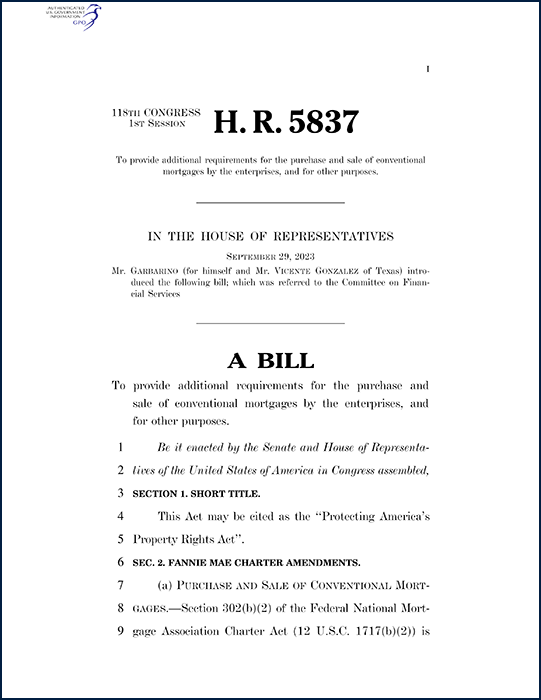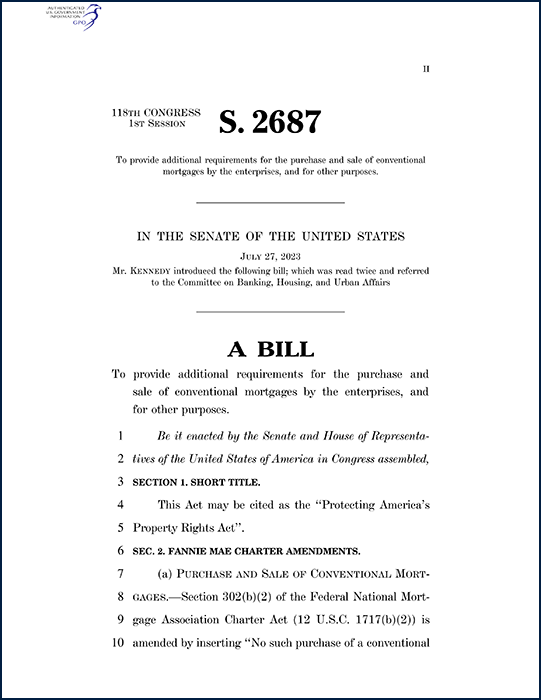Title Acceptance Pilot
On March 7, the Biden Administration released a plan aimed at lowering housing costs that includes a pilot to waive the requirement for lender’s title insurance on certain refinances. ALTA called the announcement a political gesture offering a false promise of savings for homeowners while exposing consumers, lenders and taxpayers to greater financial risk. The plan does nothing to help expand affordable homeownership opportunities to those most in need.
- Read ALTA’s full statement here.
Attorney Opinion Letters
In addition, Fannie Mae and Freddie Mac are now accepting written AOLs in lieu of a title insurance policy under limited circumstances as a result of Equitable Housing Finance Plans announced by the FHFA. Since before the announcement, ALTA has engaged with the FHFA and government-sponsored entities (GSEs) to help them understand the differences between title insurance and alternative products in the coverage and protection they provide.
ALTA Position
ALTA believes it is misguided for lenders to offer a title waiver or title insurance alternatives that provide less coverage but introduce more risk to lenders and consumers. ALTA continues to work with the GSEs to ensure that access to sustainable homeownership opportunities is available for all Americans in a way that does not increase risk or undermine the property rights of homebuyers, particularly low- and moderate-income and first-time homebuyers.
Protecting America’s Property Rights Act
Introduced in both the Senate and House, the bipartisan Protecting America’s Property Rights Act would require all loans purchased by Fannie Mae and Freddie Mac (the GSEs) to be protected by state regulated title insurance policies. It would also require enhanced oversight of any new programs or activities proposed by the GSEs, like the title waiver pilot Fannie Mae and the Federal Housing Finance Agency shelved in 2023. The legislation would help protect the U.S. from the GSEs making similar risky decisions like the ones in 2008 that resulted in the 2008 financial crisis and cost taxpayers more than $200 billion.
Legislative Toolkit
- Protecting Americas Property Rights Act One Pager
- ALTA Statement on Fannie Mae Expanding Use of Attorney Opinion Letters - December 2023
- Understanding the Cost of Title Insurance
- Unregulated Title Insurance Alternatives Risks to Homeowners and Lenders
- Frequently Asked Questions for Lenders Considering Title Insurance vs Attorney Opinion Letters
ALTA Activity
- ALTA developed a comparison chart that highlights the more comprehensive protection an ALTA Loan Policy provides versus an AOL with a liability wrap.
- ALTA letter to FHFA Director Sandra Thompson outlines concerns about the gaps and inadequacies with title insurance alternatives currently under consideration as part of the Equitable Housing Finance Plans, especially as they relate to consumer protection risks.
- ALTA presentation to the NAIC Title Task Force about title insurance and alternative products highlights a number of questions regulators should be asking about these products in the marketplace.
Who's at Risk
Risks to Homebuyers
- The overwhelming majority of homebuyers purchase owners title insurance. However, the AOL product does not provide coverage to owners.
- Should a title issue arise on a property covered by an attorney opinion only, the buyer would need to prove negligence on the part of the attorney to pursue the claim with them.
- If not proven, a claimant would likely need to pay the legal costs involved to litigate the title matter, posing a financial burden and a significant risk.
Alternative Products Increase Lender Risk
- Historically, lenders have preferred the protection of a title insurance policy because it provides the best mix of strong protections and low cost. Lenders considering the use of AOLs or other alternatives must understand the risks they are taking on by not getting title insurance since they will be on the hook given Fannie Mae and Freddie Mac’s life of loan representations and warranties related to title.
- One sizable risk is related to items not discoverable in a public records search like federal tax liens, mis-indexed items or HOA liens. An attorney opinion letter does not cover items not shown in a public records search.
- Another important example of the difference in coverage is fraud or forgery of title documents. Title insurance provides coverage when a seller’s deed was forged or there was fraud with the previous owner’s will. An attorney opinion letter does not.
- Unlike an AOL, title insurance provides lenders with a defense—including all attorneys’ fees and costs—in a lien priority dispute or other matter covered by the policy.
- Lastly, unlike title insurance, AOLs might push more consumers into foreclosure since that is a condition to making valid claim under the service provider policy wrapper.

